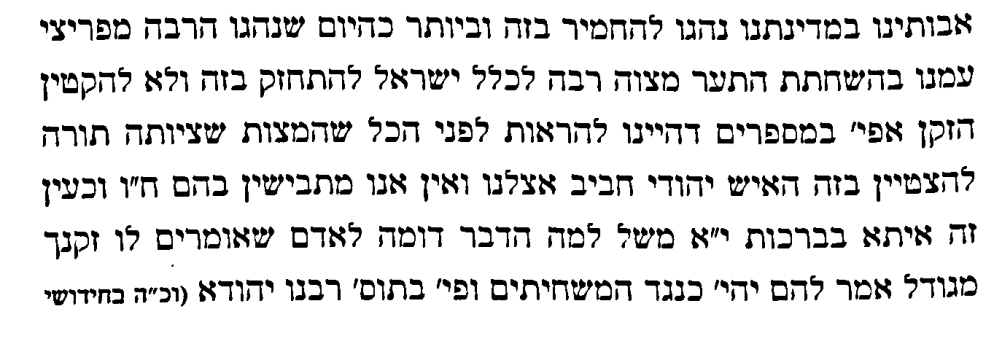I've edited the question to include the text of Orchos Yosher.
I believe that Rav Chaim's point is much narrower. He is not trying to prove from this that cutting with a scissors is forbidden. Rather, he is trying to bolster the idea that nowadays, we should act counter to those who are embarrassed about their beards. We should show everyone that the mitzvot commanded by the Torah are dear to us.
To reinforce this point, he brought Berachot 11a:
תָּנוּ רַבָּנַן, בֵּית הִלֵּל אוֹמְרִים: עוֹמְדִין וְקוֹרִין, יוֹשְׁבִין וְקוֹרִין, וּמַטִּין וְקוֹרִין, הוֹלְכִין בַּדֶּרֶךְ וְקוֹרִין, עוֹשִׂין בִּמְלַאכְתָּן וְקוֹרִין. וּמַעֲשֶׂה בְּרַבִּי יִשְׁמָעֵאל וְרַבִּי אֶלְעָזָר בֶּן עֲזַרְיָה, שֶׁהָיוּ מְסוּבִּין בְּמָקוֹם אֶחָד, וְהָיָה רַבִּי יִשְׁמָעֵאל מוּטֶּה, וְרַבִּי אֶלְעָזָר בֶּן עֲזַרְיָה זָקוּף. כֵּיוָן שֶׁהִגִּיעַ זְמַן קְרִיאַת שְׁמַע, הִטָּה רַבִּי אֶלְעָזָר וְזָקַף רַבִּי יִשְׁמָעֵאל. אָמַר לוֹ רַבִּי אֶלְעָזָר בֶּן עֲזַרְיָה לְרַבִּי יִשְׁמָעֵאל: יִשְׁמָעֵאל אָחִי, אֶמְשׁוֹל לְךָ מָשָׁל לְמָה הַדָּבָר דּוֹמֶה — מָשָׁל לְאֶחָד שֶׁאוֹמְרִים לוֹ זְקָנְךָ מְגוּדָּל! אָמַר לָהֶם: יִהְיֶה כְּנֶגֶד הַמַּשְׁחִיתִים. אַף כָּךְ אַתָּה, כָּל זְמַן שֶׁאֲנִי זָקוּף — אַתָּה מוּטֶּה, עַכְשָׁיו כְּשֶׁאֲנִי הִטֵּתִי אַתָּה זָקַפְתָּ.
The Sages taught in a baraita that Beit Hillel say: One may recite Shema in any situation: Standing and reciting, sitting and reciting, reclining and reciting, walking and reciting and even working and reciting. And in the Tosefta an incident is related where two tanna’im, Rabbi Yishmael and Rabbi Elazar ben Azarya, who were both disciples of Beit Hillel, were reclining at a meal in one place together with their students, and Rabbi Yishmael was reclined as was the customary dining position, and Rabbi Elazar ben Azarya was upright. When the time to recite the evening Shema arrived, Rabbi Elazar reclined to recite Shema in accordance with the opinion of Beit Shammai, while Rabbi Yishmael sat upright to recite Shema. Rabbi Elazar ben Azarya appeared to take offense, and said to Rabbi Yishmael: Yishmael, my brother, I will tell you a parable to which this is similar. It is comparable to a situation where one to whom people say as a compliment: Your beard is full and suits you. That man says to them: May it be against those who shave and destroy their beards, i.e., the only reason I grow my beard is to irritate those who cut their own (Rashba). You are the same. As long as I am upright, you are reclined, and now when I reclined lauding your conduct and emulating you, you sat upright as if to demonstrate that whatever I do, you do the opposite.
The idea here is that the person had a rather full and long beard, and was complimented for it, זְקָנְךָ מְגוּדָּל. He responded that the reason he grew his beard out so much was to counter those who shave improperly.
Rav Kanievsky's focus in citing this gemara is NOT on whether there are some who might act properly (e.g. with a scissors, if that were the case). Though he does add the words legamrei, that they destroy it entirely, that they don't have any beards at all. Rather, it is that this fellow in the analogy acted lehach'is. And so too, he says, we should act lehach'is.
Your question is whether the focus on countering those who destroy it entirely should be evidence that with scissors are permitted. Maybe, though note that he is talking about lehaktin, to trim, and not necessarily to get to the bare skin.
Also, while earlier positions set out in the sefer are that it would be forbidden because of lo tashchit, or chukat goyim, or lo yilbash, here his point is that this person in the analogy was proud of the mitzvot, and so went counter to what others were doing (to the level of prohibition). So from a hashkafic approach we shouldn't trim.
Comments and other answers have already written counter to the sefer Hadras Ponim-Zokon. I'll add that I concur with the disagreement with the sefer. The Targum Yonatan on Chumash is properly called Targum Yerushalmi, since Yonatan ben Uziel didn't translate chumash. Further, there are many valid counterarguments to the positions set out in the sefer, and many major talmidei chachamim through the generations who permitted, based on alternative understandings of gemaras. The sefer is a polemic, and doesn't admit the potential validity of the other positions. Meanwhile, we pasken like Bet Hillel in part because they first mentioned the positions of Bet Shammai.


